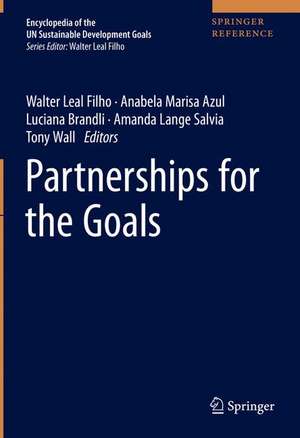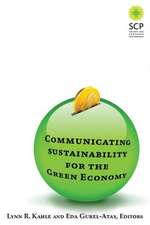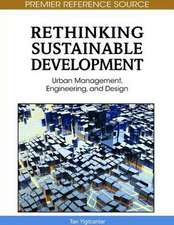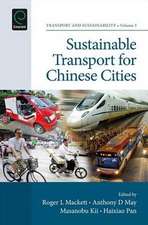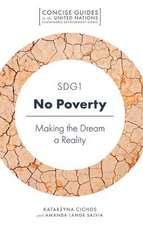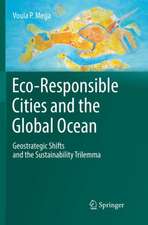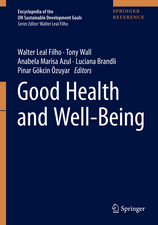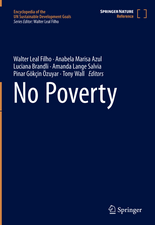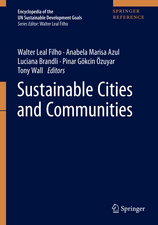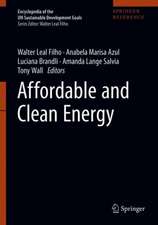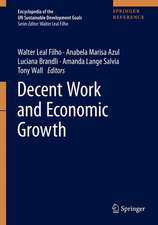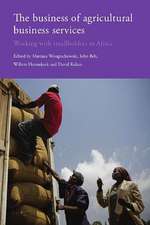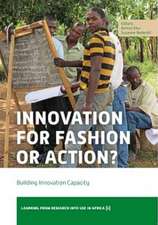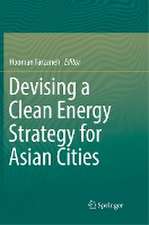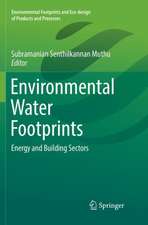Partnerships for the Goals: Encyclopedia of the UN Sustainable Development Goals
Editat de Walter Leal Filho, Anabela Marisa Azul, Luciana Brandli, Amanda Lange Salvia, Tony Wallen Limba Engleză Hardback – apr 2021
The Encyclopedia of the UN Sustainable Development Goals comprehensively addresses the SDGs in an integrated way. The Encyclopedia encompasses 17 volumes, each one devoted to one of the 17 SDGs. This volume addresses SDG 17, namely "Strengthen the means of implementation andrevitalize the global partnership for sustainable development" and contains the description of a range of terms, which allows a better understanding and fosters knowledge. The approval of the SDGs by the 194 countries of the UN General Assembly implies that issues such as combating climate change; distributing resources fairly; providing security and protection; generating employment; and ensuring quality health care and education need the concerted efforts of everyone. SDG 17 seeks to dismantle structures and procedures built on inequality of access and develop strategies that ensure collaboration and sharing of resources and opportunities.
The topics covered concern finance, technology, capacity-building, trade and systemic issues:
- Domestic resource mobilization
- Domestic capacity for tax and other revenue collection
- Long-term debt sustainability for developing countries
- Debt financing, debt relief, dept restructuring
- Globaltechnology facilitation mechanism
- Technology, bank and science, technology and innovation capacity-building mechanism
- Enhanced information and communications technology
- Universal, rules-based, open, non-discriminatory and equitable multilateral trading system under WTO
- Increased exports of developing countries
- Global macroeconomic stability
- Policy coordination and policy coherence
- Promotion of effective public, public-private and civil society partnerships
Editorial Board
Carolina Collaro, Sonja Rewhorn, Elena Shabliy, Monica Thiel, Marco Tortora, Tony Wall
Din seria Encyclopedia of the UN Sustainable Development Goals
- 18%
 Preț: 3893.48 lei
Preț: 3893.48 lei - 18%
 Preț: 3610.14 lei
Preț: 3610.14 lei - 18%
 Preț: 3367.85 lei
Preț: 3367.85 lei - 18%
 Preț: 3882.42 lei
Preț: 3882.42 lei - 18%
 Preț: 3896.62 lei
Preț: 3896.62 lei - 18%
 Preț: 3880.85 lei
Preț: 3880.85 lei - 18%
 Preț: 3344.20 lei
Preț: 3344.20 lei - 18%
 Preț: 3352.06 lei
Preț: 3352.06 lei - 24%
 Preț: 3402.30 lei
Preț: 3402.30 lei - 18%
 Preț: 3359.96 lei
Preț: 3359.96 lei - 24%
 Preț: 2926.08 lei
Preț: 2926.08 lei - 18%
 Preț: 3408.87 lei
Preț: 3408.87 lei - 18%
 Preț: 3404.14 lei
Preț: 3404.14 lei - 18%
 Preț: 3404.14 lei
Preț: 3404.14 lei - 24%
 Preț: 2427.06 lei
Preț: 2427.06 lei - 24%
 Preț: 2915.07 lei
Preț: 2915.07 lei
Preț: 3413.60 lei
Preț vechi: 4162.94 lei
-18% Nou
Puncte Express: 5120
Preț estimativ în valută:
653.40€ • 709.98$ • 549.21£
653.40€ • 709.98$ • 549.21£
Carte disponibilă
Livrare economică 31 martie-14 aprilie
Preluare comenzi: 021 569.72.76
Specificații
ISBN-13: 9783319959627
ISBN-10: 331995962X
Pagini: 1373
Ilustrații: XXX, 1373 p. 185 illus., 149 illus. in color. In 2 volumes, not available separately.
Dimensiuni: 178 x 254 mm
Greutate: 4.08 kg
Ediția:1st ed. 2021
Editura: Springer International Publishing
Colecția Springer
Seria Encyclopedia of the UN Sustainable Development Goals
Locul publicării:Cham, Switzerland
ISBN-10: 331995962X
Pagini: 1373
Ilustrații: XXX, 1373 p. 185 illus., 149 illus. in color. In 2 volumes, not available separately.
Dimensiuni: 178 x 254 mm
Greutate: 4.08 kg
Ediția:1st ed. 2021
Editura: Springer International Publishing
Colecția Springer
Seria Encyclopedia of the UN Sustainable Development Goals
Locul publicării:Cham, Switzerland
Cuprins
Domestic resource mobilization.- Domestic capacity for tax and other revenue collection.- Attaining long-term debt sustainability for developing countries.- Debt financing, debt relief, dept restructuring.- Global technology facilitation mechanism.- Operationalize the technology bank and science.- Enhance information and communications technology.- Universal, rules-based, open, non-discriminatory and equitable multilateral trading system under WTO.- Increase exports of developing countries.- Global macroeconomic stability.- Policy coordination and policy coherence.- Promote effective public, public-private and civil society partnerships.
Notă biografică
Walter Leal Filho (BSc, PhD, DSc, DPhil, DEd, DL, DLitt) is a Senior Professor and Head of the Research and Transfer Centre "Sustainable Development and Climate Change Management” at Hamburg University of Applied Sciences in Germany, and Chair of Environment and Technology at Manchester Metropolitan University, UK. He is the initiator of the Word Sustainable Development Symposia (WSSD-U) series, and chairs the Inter-University Sustainable Development Research Programme. Professor Leal Filho has written, co-written, edited or co-edited more than 400 publications, including books, book chapters and papers in refereed journals.
Anabela Marisa Azul is a Researcher at the Center for Neuroscience and Cell Biology (CNC) and the Institute for Interdisciplinary Research of the University of Coimbra (UC, Portugal). She holds a Ph.D. in Biological Sciences, specializing in Ecology (2002, UC), and pursued her investigation on biology and ecology of fungi to pinpoint the role of mycorrhizal symbiosis for sustainability of Mediterranean forests under different land use scenarios at the Centre for Functional Ecology (CFE-UC), where she became an Associate Researcher (from 2009 to 2014). At CFE-UC, Marisa Azul developed a holistic approach that combined innovation in food production with sustainable development and public scientific awareness to multiple actors. At CNC, from 2014 on, Marisa Azul focuses her investigation on basic research and participatory research dynamics to pinpoint links between metabolism, health/disease, and sustainability. She has broad academic experience as a researcher working in participatory research and interdisciplinary that link biomedical and life/environmental sciences, social sciences, science education, science communication, and artistic forms. Her research interests also lie in bringing together the academy and social/economical players. She has been successful in attracting national and international funding, coordinating projects, and mentoring young researchers on the topics mentioned. She has co-authored over 40 scientific publications and book chapters, co-edited 4 books on Climate Change Management Series and 1 onWorld Sustainability Series published by Springer, co-authored 4 books for children and 2 comics, and co-produced 1 animation.
Anabela Marisa Azul is a Researcher at the Center for Neuroscience and Cell Biology (CNC) and the Institute for Interdisciplinary Research of the University of Coimbra (UC, Portugal). She holds a Ph.D. in Biological Sciences, specializing in Ecology (2002, UC), and pursued her investigation on biology and ecology of fungi to pinpoint the role of mycorrhizal symbiosis for sustainability of Mediterranean forests under different land use scenarios at the Centre for Functional Ecology (CFE-UC), where she became an Associate Researcher (from 2009 to 2014). At CFE-UC, Marisa Azul developed a holistic approach that combined innovation in food production with sustainable development and public scientific awareness to multiple actors. At CNC, from 2014 on, Marisa Azul focuses her investigation on basic research and participatory research dynamics to pinpoint links between metabolism, health/disease, and sustainability. She has broad academic experience as a researcher working in participatory research and interdisciplinary that link biomedical and life/environmental sciences, social sciences, science education, science communication, and artistic forms. Her research interests also lie in bringing together the academy and social/economical players. She has been successful in attracting national and international funding, coordinating projects, and mentoring young researchers on the topics mentioned. She has co-authored over 40 scientific publications and book chapters, co-edited 4 books on Climate Change Management Series and 1 onWorld Sustainability Series published by Springer, co-authored 4 books for children and 2 comics, and co-produced 1 animation.
Luciana Brandli, Ph.D., is an Associate Professor in the University of Passo Fundo, Brazil, working in the Ph.D. Program in Civil and Environment Engineering. Her current research interests include sustainability in higher education and green campus, management of urban infrastructure and sustainable cities, and the Agenda 2030 for sustainable development. She supervises a number of Master’s and Doctoral students on engineering and environment and sustainability issues and has in excess of 300 publications, including books, book chapters, and papers in refereed journals.
Amanda Lange Salviahas a degree in Environmental Engineering from the University of Passo Fundo, Brazil, and graduate studies focused on sustainable cities and universities. Her work focuses on the Sustainable Development Goals, the role of universities towards sustainability and the impacts of climate change. Amanda has experience with international studies assessing aspects related to the 2030 Agenda and sustainability in higher education. She is reviewer of various journals and is also a member of the editorial board of the International Journal of Sustainability in Higher Education.
Tony Wall (BSc Hons, PGDip, PGCHE, MA, MSc, EdD, MCIPD, NTFHEA) is a Professor, Founder and Director of the International Thriving at Work Research Group in the United Kingdom where he is the institutional lead for the Inter-University Sustainable Development Research Programme. His research impact work has won multiple Santander International Research Excellence Awardsand a National Fellowship of the Higher Education Academy. Apart from being a visiting scholar in the US and Australia, his change work includes co-founding of the Washington Ethical Leadership Summit and the TS Eliot Foundation’s International Creative Practice for Wellbeing Framework.
Caracteristici
Fosters knowledge to support the development goal to strengthen the global partnership for sustainable development Details current research, projects, and practical action Provides a sound basis to promote sustainability efforts
